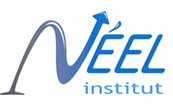- Home
- Institut Néel
- Research teams
- Technical Groups & Services
- Work at the Institut
- Partnerships
Zoom link:
https://univ-grenoble-alpes-fr.zoom.us/j/93392809891?pwd=ZWNCNzYzUjhaRG1hZC9VZkJTTzJpQT09
Title: « Chirality-assisted spin vortices and tunable toroidal moments in a frustrated magnet »
Abstract:
Toroidal moments naturally arise from vortex-like arrangements of spins. Ferrotoroidal order, which represents a spontaneous arrangement of toroidal moments, has recently been found in a few linear magnetoelectric materials. However, tuning toroidal moments in these materials is challenging due to the requirement of a conjugate toroidal field. In this talk, I present the realization of switching between ferritoroidal and ferrotoroidal phases by a small magnetic field, in a chiral triangular-lattice magnet BaCoSiO4 with tri-spin vortices. These vortices are arranged in a staggered fashion in zero magnetic field, giving rise to a ferritoroidal order and non-zero vector and scalar spin chirality, directly coupled with a ferromagnetic component. Upon applying a magnetic field, multi-stair metamagnetic transitions, characterized by equidistant steps in the net magnetic and toroidal moments , develop. Consequently, the system enters in a ferrotoroidal state. I discuss the underpinning physical picture of the this novel ferri- ferroic transition and attribute it to a combined result of an unusual hierarchy of frustrated exchange couplings and the antisymmetric exchange interactions driven by the crystallographic chirality. These findings open up new avenues for realizing easily tunable toroidal orders and spin chirality.
Brief biography:
Lei Ding joined the Institut Néel in May 2021 as a postdoc researcher working with Virginie Simonet, Manila Songvilay and Claire Colin. Prior to that, he was a postdoctoral fellow in the diffraction section at the Oak Ridge National Laboratory, USA, where he conducted research on multiferroics and magnetic topologicalinsulators.In2016-2019, he was appointed the Rutherford International fellowship at the ISIS neutron and muon source, UK, dedicating to studying novel strongly correlated electronic materials using neutron scattering and muon spin relaxation techniques. He received his PhD degree from the Institut Néel & Université Grenoble Alpes, France, in Physics in 2015, working with Pierre Bordet and Claire Colin. His research interest lies in strongly correlated electronic systems with a particular focus on the study of emergent orders and excitations in novel magnetic materials including frustrated magnets, multiferroics and magnetic topological insulators.
